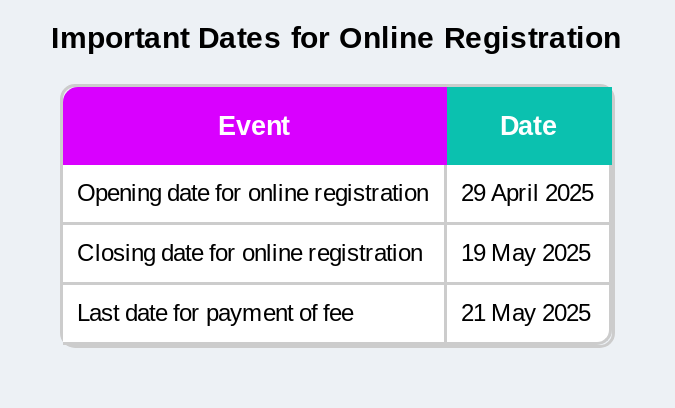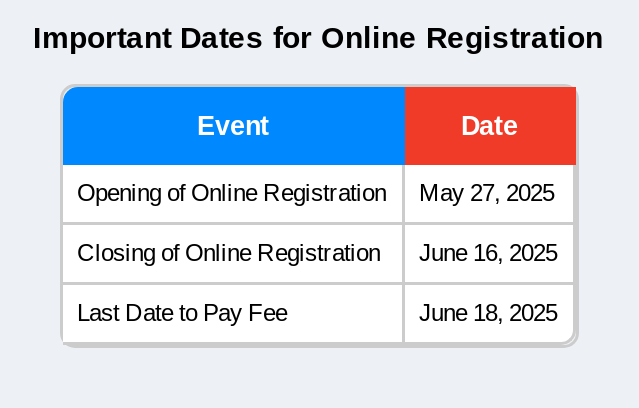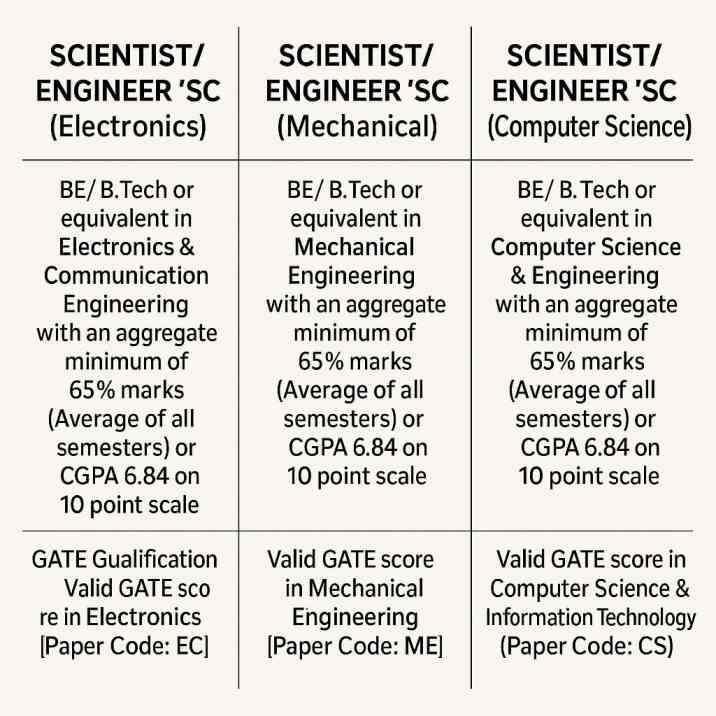The ISRO Exam Date 2025 is out. As per reports, the exam the board will conduct the exam in the second week of December 2025. ISRO has recently released 60+ vacancies for Engineer/SC posts across various centers. The educational requirements for the job are live now. You can check them below. The age limit is set at 28 years as of 19.05.2025.
ISRO Exam Date 2025 (SC)

The online registration for the ISRO exam 2025 (SC) was started on 29th April 2025. Candidates were able to fill out and submit their application forms through the official ISRO portal. The last date to complete the online registration process was 19th May 2025. After submitting the form, candidates must pay the required application fee. The last date for fee payment was 21st May 2025. The ISRO Exam Date 2025 (SC) will be conducted on December 2025.
For official career opportunities, visit the ISRO recruitment page.
ISRO Exam Date 2025 (ICRB)

The online registration for the ISRO exam 2025 (ICRB) began on 27th May 2025. Candidates can access the official ISRO portal to fill out and submit their application forms within the given time. The last date to complete the online registration process is 16th June 2025. After submitting the form, applicants must pay the examination fee. The last date for fee payment is 18th June 2025. The ISRO Exam Date 2025 is tentatively scheduled for December 2025.
RRB NTPC Exam date 2025 is also live now. Check every detail on our website.
ISRO Exam 2025 Posts
In the ISRO entrance exam 2025, candidates can apply for several posts. These are majorly for the students from engineering backgrounds. The vacancies are available across various ISRO centres in India. There are three main posts: BE001, BE002, and BE003.
- BE001 Scientist/Engineer ‘SC’ (Electronics)
- BE002 Scientist/Engineer ‘SC’ (Mechanical)
- BE003 Scientist/Engineer ‘SC’ (Computer Science)
The post of Scientist/Engineer ‘SC’ (Electronics) has 22 vacancies. Selected candidates may be posted at different ISRO centres. These include HSFC and URSC in Bengaluru, NRSC in Hyderabad, SAC in Ahmedabad, SDSC SHAR in Sriharikota, and VSSC in Thiruvananthapuram.
The post of Scientist/Engineer ‘SC’ (Mechanical) has 33 vacancies. Qualified candidates may be posted at HSFC and URSC in Bengaluru, IPRC in Mahendragiri, SAC in Ahmedabad, SDSC SHAR in Sriharikota, VSSC in Thiruvananthapuram, and LPSC in Valiamala.
The post of Scientist/Engineer ‘SC’ (Computer Science) has 8 vacancies. Candidates who qualify may be posted at HSFC and URSC in Bengaluru, MCF in Hassan, NRSC in Hyderabad, and SAC in Ahmedabad.
ISRO Exam Eligibility
If you are curious about the ISRO Exam Date 2025, you must check the ISRO exam eligibility carefully. Each post has a different set of educational requirements. Candidates who do not meet the ISRO exam eligibility will not be allowed to take the exam. Even if you apply for any of the posts without meeting the criteria, the application will get rejected then and there.

For Scientist/Engineer ‘SC’ (Electronics)
- Must have BE/B.Tech or equivalent degree in Electronics & Communication Engineering
- Minimum 65% marks or CGPA of 6.84 on a 10-point scale
- Must have a valid GATE score in Electronics & Communication Engineering (Paper Code: EC)
For Scientist/Engineer ‘SC’ (Mechanical)
- Must have BE/B.Tech or equivalent degree in Mechanical Engineering
- Minimum 65% marks or CGPA of 6.84 on a 10-point scale
- Must have a valid GATE score in Mechanical Engineering (Paper Code: ME)
For Scientist/Engineer ‘SC’ (Computer Science)
- Must have BE/B.Tech or equivalent degree in Computer Science & Engineering
- Minimum 65% marks or CGPA of 6.84 on a 10-point scale
- Must have a valid GATE score in Computer Science & Information Technology (Paper Code: CS)
Some other important points regarding the ISRO Exam Eligibility:
- Graduation must be completed within the standard course time as given by the university.
- If both CGPA and percentage are shown on the degree, one must meet the eligibility norms.
- If only CGPA is shown, it must meet the eligibility directly. Conversion into percentage is not allowed.
- If only the percentage is shown, it must match the eligibility requirement.
- For the candidates of the Dual/Integrated Degree programs:
- If a separate CGPA or percentage for UG and PG is given, the ISRO exam council will use the UG value.
- In case, only one value is given for the full course, that value will be used.
- If no CGPA or percentage is on the degree, then the cumulative value from the final/consolidated marksheet will be used.
- All the above rules apply even if the university provides conversion formulas.
ISRO Exam Syllabus
Below is a simple breakdown of the ISRO exam syllabus for various branches.
ISRO Exam Syllabus for Mechanical Engineering
The ISRO exam syllabus for mechanical engineering includes subjects from core mechanical topics. Candidates need to study topics like Engineering Mechanics, Strength of Materials, Thermodynamics, and more.
- Engineering Mechanics covers statics, dynamics, friction, moment of inertia, work and energy, and rigid body dynamics.
- Strength of Materials includes stress and strain, bending stress, shear force, bending moment, torsion, and types of cylinders.
- Thermodynamics includes laws of thermodynamics, different cycles, heat engines, refrigeration, and air-conditioning.
- Fluid Mechanics has topics like fluid statics, fluid dynamics, Bernoulli’s equation, and flow in pipes.
- Machine Design focuses on designing machine parts such as bearings, shafts, springs, gears, and fasteners.
- Manufacturing Processes includes casting, welding, machining, CNC, additive manufacturing, and material handling.
ISRO Exam Syllabus for Electronics and Communication
The ISRO exam syllabus for electronics and communication includes both theoretical and practical topics.
- Circuit Theory includes Ohm’s Law, Kirchhoff’s laws, network theorems, AC/DC circuits, and resonance.
- Signals and Systems has topics like Fourier series, Laplace and Z transforms, filters, and digital signal processing.
- Electronic Devices include diodes, transistors, FETs, operational amplifiers, oscillators, and voltage regulators.
- Digital Electronics covers number systems, logic gates, flip-flops, counters, registers, and ADC/DAC.
- Control Systems includes open/closed loop systems, stability analysis, root locus, Bode plots, and PID controllers.
- Communication Systems contains modulation techniques like AM, FM, PM, PCM, and error control coding.
ISRO Exam Syllabus for Computer Science Engineering
The ISRO exam syllabus for computer science focuses on programming, databases, algorithms, and computer systems.
- Data Structures and Algorithms includes arrays, linked lists, stacks, queues, trees, sorting and searching.
- Operating Systems focuses on process and memory management, file systems, scheduling, and virtual memory.
- Database Management Systems (DBMS) has SQL, relational models, normalization, ER diagrams, and transactions.
- Computer Networks includes OSI model, TCP/IP, routing, IPv4/IPv6, and network protocols.
- Software Engineering covers software life cycle, testing, maintenance, and agile methods.
- Discrete Mathematics includes set theory, logic, graph theory, combinatorics, and automata theory.
ISRO Exam Syllabus for Civil Engineering
The ISRO exam syllabus for civil engineering includes topics from structures, materials, environment, and surveying.
- Structural Engineering includes analysis of beams, trusses, columns, and design using concrete and steel.
- Surveying covers theodolite use, GPS, chain, compass, and levelling.
- Geotechnical Engineering has soil mechanics, foundation engineering, and settlement studies.
- Fluid Mechanics includes Bernoulli’s equation, pipe flow, and open channel flow.
- Building Materials includes cement, concrete, bricks, timber, steel, and material testing.
- Environmental Engineering covers treatment of water, air pollution, noise control, and solid waste management.
- Transportation Engineering includes highway planning, pavement design, and traffic systems.
ISRO Exam Syllabus for Electrical Engineering
The ISRO exam syllabus for electrical engineering includes electrical circuits, machines, power systems, and electronics.
- Circuit Theory includes both AC and DC circuits, network theorems, and transient analysis.
- Control Systems includes stability, transfer functions, feedback, and Bode plots.
- Electrical Machines covers transformers, motors, motor control, and power factor.
- Power Systems includes power generation, transmission, fault analysis, and load flow.
- Power Electronics has rectifiers, converters, inverters, and semiconductor devices.
- Signal Processing includes sampling, Fourier transform, filters, and signal analysis.
- Electromagnetic Fields includes Maxwell’s equations, wave propagation, and transmission lines.
ISRO Exam Syllabus for Aerospace Engineering
The ISRO exam syllabus for aerospace engineering includes subjects related to aircraft, propulsion, and spacecraft.
- Aerodynamics includes airfoil theory, lift and drag, boundary layer, and compressible flow.
- Flight Mechanics has aircraft performance, stability, and flight control.
- Aircraft Structures includes stress analysis, materials, fatigue, and composite structures.
- Propulsion covers jet and rocket engines, combustion, and turbomachinery.
- Control Systems includes flight stability, sensors, and actuators used in flight control.
- Avionics includes communication systems, radar, and satellite navigation.
- Spacecraft Systems includes satellite design, launch vehicles, orbital mechanics, and space exploration.
ISRO Exam Date 2025 Details
The ISRO Exam Date 2025 is expected to fall in the second week of December 2025. Visit our site and keep an eye on updates related to the ISRO Exam Date 2025.
The written exam for ISRO Scientist/Engineer ‘SC’ is basic. You will attempt multiple-choice questions (MCQs). The MCQs are divided into two main parts—Part A and Part B. The total exam duration is 2 hours (120 minutes), and the exam is for a total of 100 marks.
In Part A, there are 80 questions based on the candidate’s core engineering subject—Mechanical, Electronics, Computer Science, etc. In Part B, there are 20 questions focused on general aptitude.
The marking scheme is also simple. For every correct answer, you will get +1 mark. For each wrong answer, 1/3 mark will get deducted. If you leave a question blank, you don’t lose any marks. The core section (Part A) will test your engineering background. On the other hand, the aptitude section (Part B) checks your thinking and reasoning abilities.
Since the ISRO Exam Date 2025 is close to the end of the year, you should avoid last minute preparation and focus on completing the syllabus in advance.
FAQs
Will ISRO conduct an exam in 2025?
Yes, an ISRO entrance exam will be held in 2025.
What is the ISRO exam date 2025?
ISRO entrance exam 2025 is scheduled for the second week of December.
What is the salary of ISRO in 2025?
The Scientist/Engineer ‘SC’ post falls under Level 10 of the Pay Matrix. It has an initial basic pay of INR 56,100 per month.